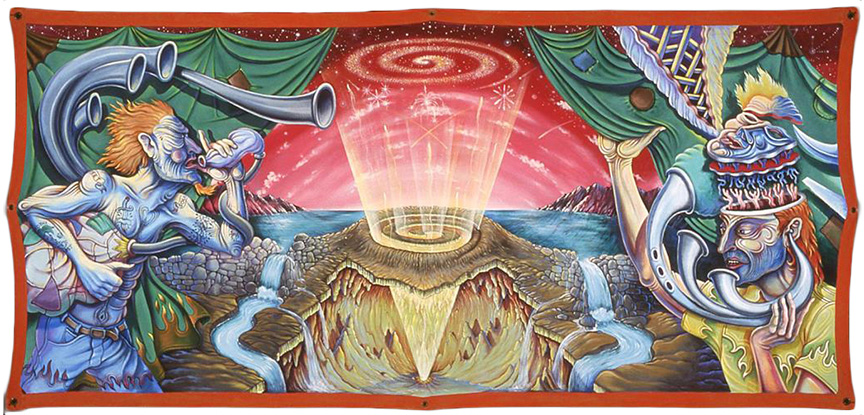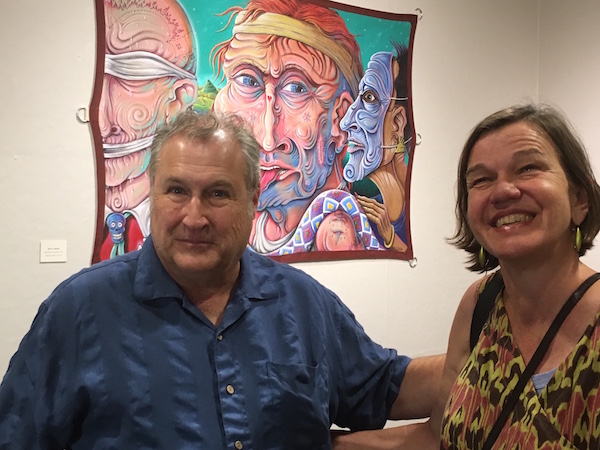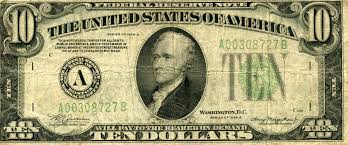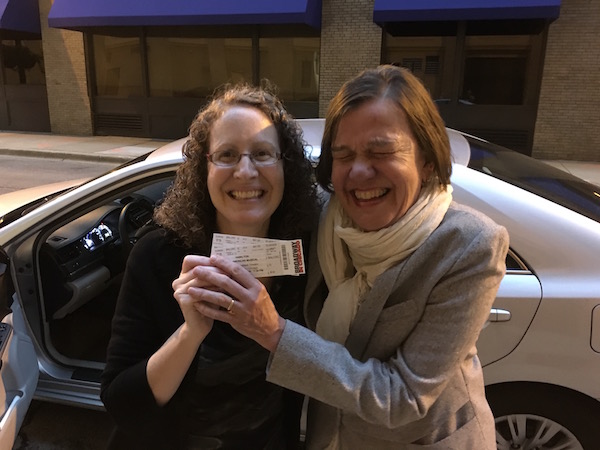
Little did Colleen and I know when we were both waitresses at the Oak Room at Marshall Field back in the 70s, that we’d be going to see a hip-hop version of Hamilton.
Was it the music? The lyrics? The voices? The musicians? The storyline? Buzz of the crowd? Sharing it alongside a dear, longtime friend? My months researching the show? The toast in the lobby bar with Colleen before curtain time?
Yes.
The Chicago version of the musical Hamilton did not disappoint, but for a minute there , I was afraid it wasn’t going to happen at all. Colleen phoned a half-hour before she was meant to pick me up, and when I heard VoiceOver on my iPhone announce the call was from Colleen I was afraid something was wrong. When I said hello and heard her stammer, I was sure something was wrong . Oh, no. ”Colleen?” I asked. “You there? You okay?” She took a breath before finally getting a word out. “Oh, Beth,” she said. “I’m laughing at myself! I’m laughing so hard I can hardly talk!”
Colleen bought our tickets at the beginning of the year after hearing that the Foundation Fighting Blindness” was one of the non-profit organizations given the opportunity to purchase blocks of Hamilton tickets to sell for fundraising. She and her teenage son have been enormous Hamilton fans from the beginning. “This is all making me feel so young!” Colleen exclaimed when Mike walked me to meet at her car. “I haven’t looked forward to anything like this for a long, long time. It’s like Christmas morning when I was a kid!” Mike insisted on taking our picture, and he laughed when he looked at us through the camera lens. “You guys look like two little girls going out to drink milk shakes or something!” he said. “It’s fantastic!”
Outside of the fact that the Chicago opening of Hamilton is taking some attention away from the baseball team in town heading to the playoffs, Mike’s been blasé about all the Hamilton hype. Still, he didn’t complain about my months of preparation and research for this musical. He even bought me the CD and read some of the lyrics to me before I figured out where to find them on line to research the wording myself. Anytime he left home, he’d return to the sound of the Broadway performance blasting from our living room speakers. “You can leave it on,” he’d sigh, but I turned it off. More fun to listen alone anyway. Then you could dance and sing along.
Overall, he’s been a good sport about my little obsession. He asked questions about — but did not attend — “In the Heights” (Lin-Manuel Miranda’s first Broadway musical) after Colleen and I went to see Chicago’s Porchlight music Theater’s production a few weeks ago. And, being a non-fiction kind of guy, he happily listened along when I’d go to bed with the audio version of Ron Chernow’s Alexander Hamilton (the biography that inspired Hamilton the musical).
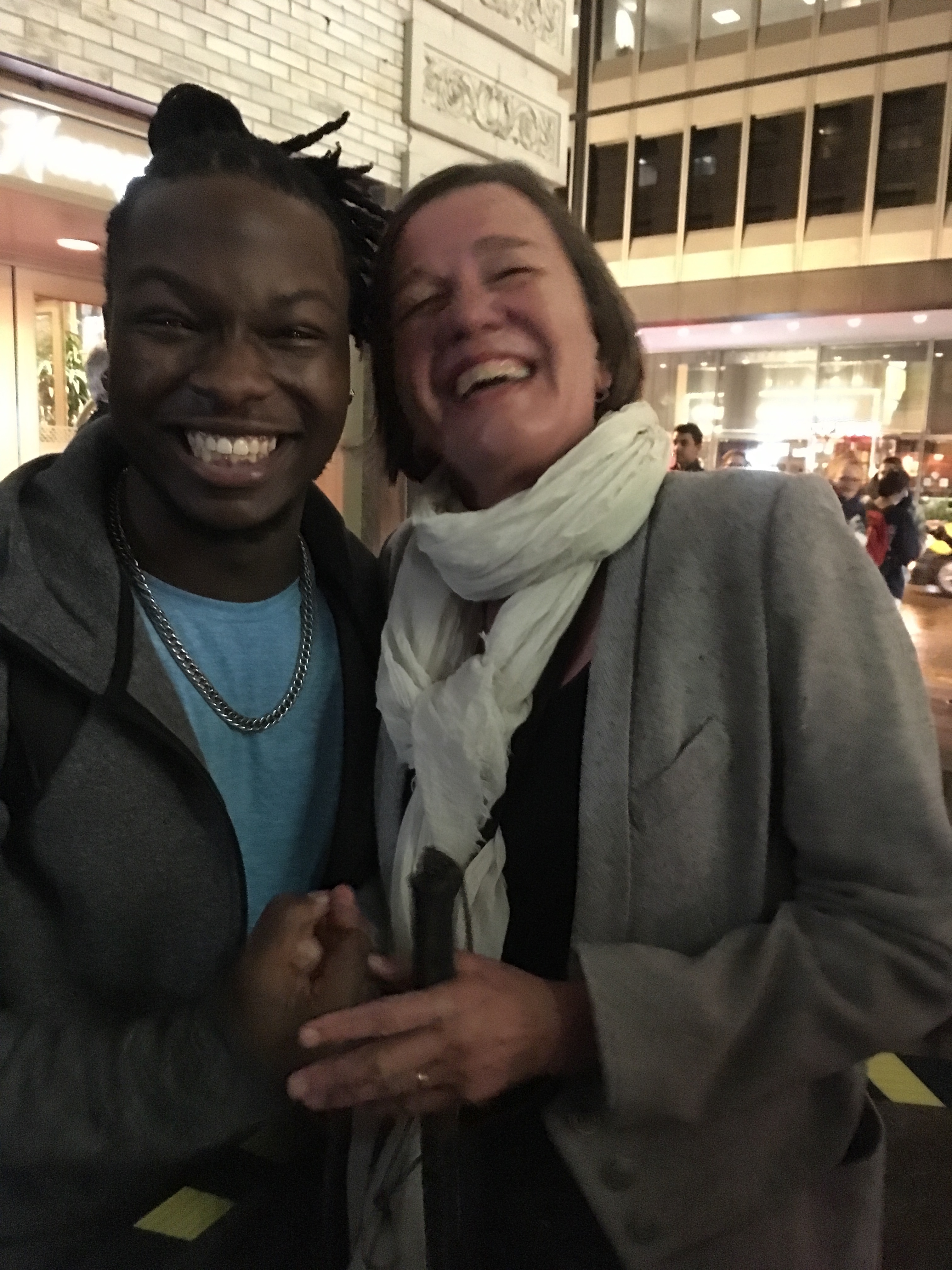
That’s me and Lafayette. Or me and Jefferson. Whichever you prefer.
Colleen chose to listen to the book on audio, too, rather than read it in print. The audio book is 38 hours long. It is absolutely astounding that the musical Hamilton covers pretty much the entire Alexander Hamilton story in three hours. The founding father packed a lot into his short life, leaving over 26 written volumes of work and oodles and oodles of personal letters behind when he died. And when he was alive? He liked to talk. To tell all that in three hours, you need to fit a lot of words in to every measure. You can’t hold onto a musical note very long — you’ve gotta move right along to the next scene. Using hip-hop was a no-brainer. And, simultaneously, brilliant.
Colleen saw tears of joy on my face when the show started and padded my knee reassuringly. “I’m crying, too!” There is no fanfare or overture before the musical Hamilton starts — it’s almost like someone says “Go!” And you’re off. We were surprised at how quickly we got to the intermission, and I was especially surprised how much easier it was to understand the lyrics when hearing them live — better than trying to decipher them while listening to the highly produced CD version at home.
And of course Colleen and I spent the intermission comparing the Chicago cast to that Broadway rendition we’d been listening to all year. I thought the Chicago Schuyler Sisters sounded more Motown than the Broadway sisters did and that casting an actor with a beautiful, strong singing voice as the Chicago Washington made more sense than the Broadway Washington, who sounded to me like so many of the other founding fathers in the recording of that production. He’s the father of our country. His voice should be big.
Colleen agreed that Chicago Washington had a beautiful voice but was disappointed that he wasn’t as good a rapper as Broadway Washington. “What does it mean to be a good rapper?” I asked. Colleen has three children between the ages of 17 and 21 and knows far more about this subject than I do. “This Washington just isn’t fast enough,” she said.
Huh. Maybe the entire Chicago cast raps slower than the Broadway cast. Is that why I could understand the live show better? The theater had provided audio headsets for people who are blind to use if we needed extra narration to follow the action, but I never even put mine on.
Some of the Chicago cast members spiced up their roles — Lafayette exaggerated his French accent a la Clouseau in the Pink Panther, Chicago King George was much more playful than his Broadway equivalent, Aaron Burr’s anger on stage in Chicago was so overwhelming that by the end it sounded like he was gritting his teeth and spitting as he sang. The exaggeration in the live performance made it much easier to keep track of all the men in the cast — it is hard at times to differentiate their voices on the Broadway CD.
That audio device the theater provided came in handy after the show, though. Taking the stairs down from the upper balcony to the lobby and then weaving through hundreds of audience members to bring it back took a long time. When we finally got outside the cast members were leaving through the side alley exit. “There’s Alexander Hamilton!” Colleen squealed. “He’s so cute, just there with a backpack on, hailing a cab.” We rushed over to the alley like giddy teenagers. “There’s one!” Colleen would say, and with white cane prominently displayed in one hand, I’d thrust the other one out. Anytime an actor took the bait and shook my hand, I’d ask who they played in the musical.
Chris Lee played Lafayette. He laughed when I thanked him for overdoing his French accent and agreed to let Colleen take a photo of us. Colleen had read the playbill out loud to me before the show started, so we knew that Chris (that’s how he introduced himself to me) played Lafayette in the first act, and he played Jefferson in the second. His previous claim to fame was starring as the Scarecrow in The Wiz last year in Greenville, South Carolina.
Joshua Henry, the actor who played Aaron Burr, had played more prominent roles in the past and had been nominated twice for a Tony award. I complimented his incredible job conveying anger on stage.
Me: “Were you spitting at the end?”
Aaron Burr: “Oh, did it hit you?”
Me, laughing: “We were in the upper balcony! But towards the end in the second act, even up there, it sounded like you were singing and gritting your teeth and spitting, all at the same time.”
Aaron Burr: (Smiling, you don’t even have to be able to see to know he was.) “That’s exactly what we’re going for.”
Mike was waiting for me in our apartment lobby and thanked Colleen with a big hug when she walked me inside. “Was it good?” he asked. Colleen and I faked frowns, responded with a simultaneous “it sucked” and then broke into giddy schoolgirl laughter.
I honest-to-God woke up the next morning hearing “Must be nice to have Hamilton on your side” in my head. Over coffee Mike told me he’d enjoyed my time with Colleen vicariously. “I was smiling so much while you were there, I’m almost ashamed of myself,” he said. “And today I feel like Scrooge on Christmas morning.”


